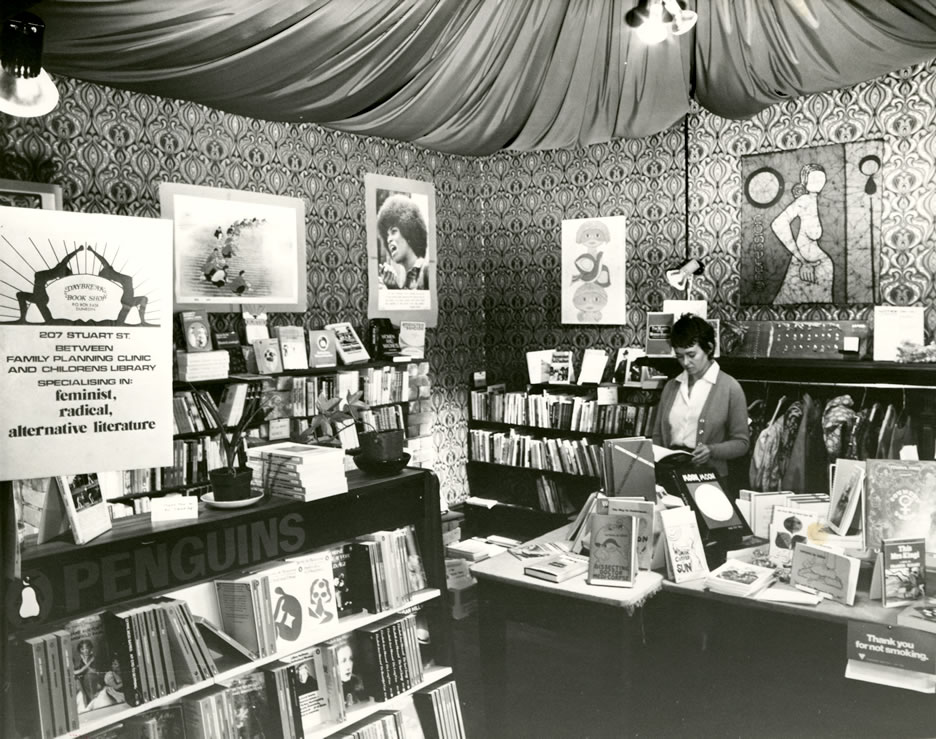This essay written by Elizabeth Harrison was first published in Women Together: a History of Women's Organisations in New Zealand in 1993.
In Dunedin in 1971, a group of eight women, inspired by the new women's movement that was swiftly spreading internationally, organised into a group they called the Dunedin Collective for Woman (DCW). [1] Its four basic aims were equal pay, quality childcare, women's control of their own bodies, and an end to sex stereotyping. In March 1972, DCW members began producing a fortnightly newsletter, Woman, and embarked on a variety of actions to educate others on the need for women's liberation. They spoke to other groups, took part in radio talkback shows, ran courses, wrote to newspapers and MPS, demonstrated for abortion law reform, and protested against beauty contests.
Most of the early members had children, and were well educated. Some had personal experience of the women's liberation movement overseas, and provided much of the background for the way the collective was set up.
The DCW expanded rapidly; by 1975 it could call on over 80 active, committed members. Wishing to stay open to as many women as possible, it resolved to remain flexible. To avoid setting down a 'party line', there was no outline of aims in a manifesto. This was reaffirmed in a decision at a seminar held as late as 1976, which stated, 'We uphold the right of each individual woman to her own experiences without their necessarily being the "Collective" opinions.' [2]
The DCW organised as it wanted society to organise: non-hierarchically, with shared decision-making and shared responsibilities. For example, each newsletter was put out by a different group. The original group coped with new members by 'reproducing like a cell': experienced members formed a nucleus for new groups, usually of eight women, a size which proved practical to 'organise meetings, from a basis of trust and practise consciousness-raising'. [3]
From these small units came awareness of shared oppression and realisation of the need for action. Throughout its existence, DCW acted as an umbrella organisation for an array of special interest groups and projects. In 1972 it ran a survey, devised by Margaret Lloyd-Thomas, which found that over 70 percent of those surveyed were in favour of making abortions easier to obtain. [4] A group of DCW members with a common interest in fertility control set up Knowhow, an advisory service on sexual matters, in 1973. That year the DCW published First Sex, Second Sex, a booklet on sex role stereotyping in infant readers, and set up a preschool; this shifted to a house in Frame Street in 1974, sharing it with a women's centre. International Women's Year (1975) produced the Cure-All-Ills All Star Travelling Women's Medicine Show and also 'Herstory', an exhibition on women in New Zealand history, which led to the first Herstory Diary being published in September 1976. [5] That year, too, members were active in introducing a university extension women's studies course, became involved in the founding of the Dunedin Community Child Care Centre, and went on to set up Dunedin's first women's refuge.
In 1976 the DCW presented submissions to the Royal Commission on Contraception, Sterilisation and Abortion, pointing out the need for the existing laws to be liberalised. When the Contraception, Sterilisation and Abortion Act was passed in 1977, hedging abortion about with new restrictions, Knowhow became the Sisters Overseas Service (SOS), helping women to go to Australia for abortions.

Hocken Collections, Michael de Hamel photograph, Box-120 -001.
Daybreak Bookshop, the first women’s bookshop in New Zealand, established by the Dunedin Collective for Woman in 1980.
That year also saw a major DCW venture, the opening of New Zealand's first feminist bookshop, Daybreak Bookshop. The name, echoing the title of a nineteenth century New Zealand women's journal with a socialist and feminist viewpoint, reflected the collective's continuing interest in women's 'herstory'. The shop relied heavily on volunteer workers.
The last newsletter was produced in August 1981, and in 1982 Daybreak Bookshop wound up. By then many of the early members had moved on to fulltime jobs and in some cases left Dunedin. DCW 'had changed lives. It had been part of and contributed enormously to a huge social movement which was resulting in legislative change as well as personal and popular attitudinal change all over the country'. [6] It had also been remarkably successful in holding numerous diverse groups under its all-encompassing umbrella for ten years.
Elizabeth Harrison
Notes
[1] The original members were Denny Boothe, Jocelyn Harris, Pat Lawson, Andrée Levesque, Judith Medlicott, Edith Mercier, Penny Moore, Diana Strang.
[2] Woman, No. 92, 15 November 1976.
[3] Harrison, 1988, pp. 34–5.
[4] Margaret Lloyd-Thomas, Report on Survey of Women's Opinions on Abortion and Contraception in Dunedin, DCW, Dunedin, 1972, p. 8.
[5] DCW, Herstory Diary 1977, John Mclndoe, Dunedin, 1976.
[6] Pauline Neale, personal communication, 13 November 1992
Unpublished sources
Dunedin Collective for Woman newsletter, Woman, 1972–1981
Harrison, Elizabeth J., 'Women's Liberation in the Far South: The Dunedin Collective for Women', Post-Graduate Diploma in Arts long essay, University of Otago, 1988

Community contributions